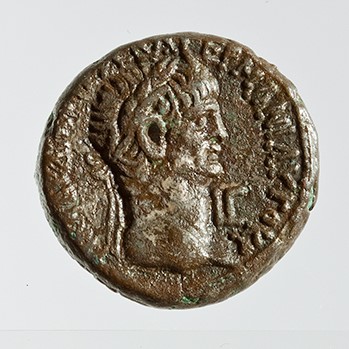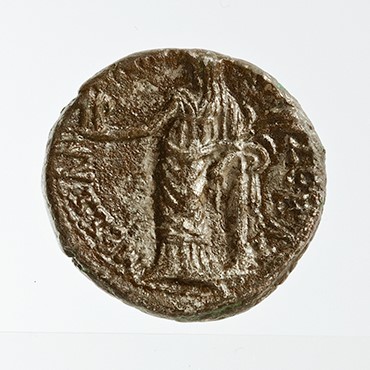Acquisition number: 1967.21
Obv.: Head of Claudius r., laureate. [TI(βεριος) ΚΛΑΥΔΙ(ος) ΚΑΙΣ(αρ) ΣΕΒΑ(στος) ΓΕΡΜΑΝΙ(κος) ΑΥΤΟΚΡ(ατωρ). In front, LG.
Rev.: Messalina as Demeter l., veiled and draped; holding in outstretched right hand two small figures (her children?), in left arm ears of grain; left arm rests on column. ΜΕΣΣΑΛ[INA ΚΑΙΣ)αρις)] ΣΕΒΑΣ(τη).
Title: Tetradrachm of Claudius - 1967.21
Acquisition number: 1967.21
Author or editor: Beryl Rawson
Culture or period: Roman Imperial
Date: AD 42-43
Material: Metal - Silver
Object type: Coins - Roman
Dimensions: 23mm (w)
Origin region or location: Egypt
Origin city: Alexandria
Display case or on loan: 5
Keywords: Coin, tetradrachm, Roman, Imperial, Claudius, Demeter, Roman Egypt, Alexandria
Burnett, A., Roman Provincial Coinage (London, British Museum Press, 1992) I, Alexandria, 5131; Poole, R.S., (ed.), A Catalogue of the Greek Coins in the British Museum (London, The British Museum, 1873-1927; repr. Bologna 1963-1964) Alexandria and the Nomes no. 71.
1967.21
Tetradrachm of Claudius
11.380 g. AD 42-43
Obv.: Head of Claudius r., laureate. [TI(βεριος) ΚΛΑΥΔΙ(ος) ΚΑΙΣ(αρ) ΣΕΒΑ(στος) ΓΕΡΜΑΝΙ(κος) ΑΥΤΟΚΡ(ατωρ). In front, LG.
Rev.: Messalina as Demeter l., veiled and draped; holding in outstretched right hand two small figures (her children?), in left arm ears of grain; left arm rests on column. ΜΕΣΣΑΛ[INA ΚΑΙΣ)αρις)] ΣΕΒΑΣ(τη).
Minted in Alexandria. The obverse legend is the Greek form of ‘Tiberius Claudius Caesar Augustus Germanicus Imperator’. The inscription in front of the head signifies ‘the third year’ (of Claudius’ reign), i.e. between August AD 42 and August 43. The reverse legend is the Greek form of ‘Messalina Caesaris Augusta’.
Messalina, Claudius’ third wife, never had the title Augusta in Rome. Only Livia, of the living imperial women, had so far had that title; Claudius’ mother Antonia received it posthumously (see on 1976.16). Agrippina the Younger (Claudius’ fourth wife) was to receive the title in AD 50 on the occasion of Claudius’ adoption of her son Nero. The occasion for the first of Messalina’s coins may have been the birth of a son, Britannicus, in AD 42. (She had already borne Claudius a daughter, Octavia. Hence the two small figures) Cassius Dio (60.12.5) reports that on this occasion Claudius showed great moderation in forbidding the title Augustus for his son and Augusta for his wife. It was probably more acceptable to apply the title to Messalina in the East than in Rome.
Demeter often appears on Alexandrian coins, symbolising the importance of grain production in Egypt.
Burnett, A., Roman Provincial Coinage (London, British Museum Press, 1992) I, Alexandria, 5131; Poole, R.S., (ed.), A Catalogue of the Greek Coins in the British Museum (London, The British Museum, 1873-1927; repr. Bologna 1963-1964) Alexandria and the Nomes no. 71.

